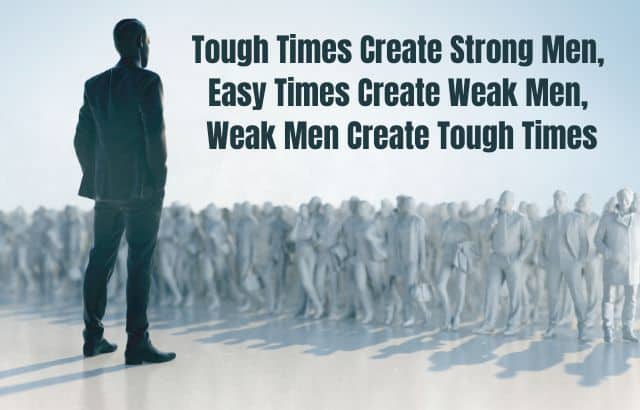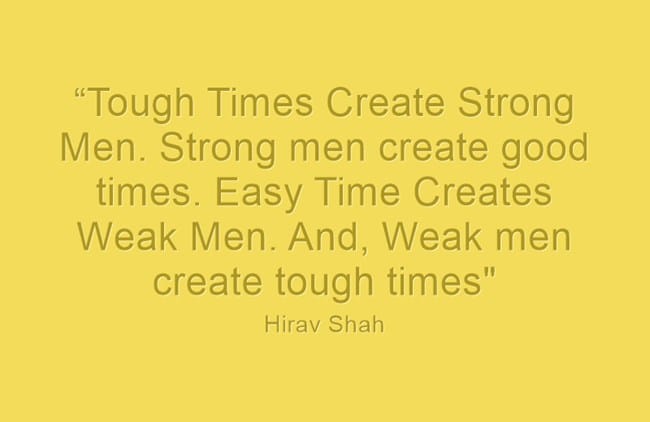The adage “Weak Men Create Tough Times, Easy Times Create Weak Men, Tough Times Create Strong Men” encapsulates a cyclical pattern observed throughout history, wherein societal conditions influence the character and resilience of individuals. Understanding this cycle offers valuable insights into the dynamics of strength, adversity, and growth.
Tough times never last. Tough times give birth to tough people. And tough people last. Yes, they do. Hence, you should actually be thankful for your tough times.
However, just the opposite happens when times are easy. Easier times create weak men. This is because there is no need to fight any hindrance or hurdle or stumbling block or difficulty or barrier. And weak men give rise to tough times and thus it forms a cycle.
Table of Contents
Definition:
The phrase illustrates the reciprocal relationship between individual strength and societal challenges. It suggests that periods of adversity forge resilience and fortitude, while times of ease and comfort may lead to complacency and weakness.
Weak men create tough times
The planet is heading head-first towards a doom it is not ready for. The present generation is in no way ready to manage any sort of a calamity of epic proportions, be it natural (global warming, ozone layer depletion, deforestation etc.) or man-made (depletion of resources leading to oil and water war or population explosion or pollution or crime or terrorism). This generation is going to perish very fast, bringing down everything they have ever made, paving way to tougher times in future.
From the work’s standpoint, when you are not striving and when you are just extremely relaxed and easy and not active and not trying hard and not experimenting and not experiencing, then it’s obvious that tougher times are going to come certainly in future. For sure…
Quotes on Weak Men Create Tough Times:
Let’s delve into each quote with explanations, strategies for application, and execution plans:
-
“A nation of sheep will beget a government of wolves.” – Edward R. Murrow
- Explanation: Murrow’s quote highlights the danger of complacency and apathy among the populace, which can lead to the rise of oppressive or authoritarian regimes.
- Strategy: Cultivate civic engagement and critical thinking. Stay informed about political issues and participate in democratic processes, such as voting and advocacy.
- Execution Plan: Educate yourself about the political landscape and key issues facing your community or nation. Volunteer for campaigns or grassroots organizations that align with your values. Engage in respectful dialogue with others to foster understanding and promote positive change.
-
“The ultimate tragedy is not the oppression and cruelty by the bad people but the silence over that by the good people.” – Martin Luther King Jr.
- Explanation: King’s quote underscores the moral imperative of speaking out against injustice and standing up for what is right, even in the face of adversity.
- Strategy: Practice courage and moral integrity. Advocate for marginalized communities and challenge systems of oppression and discrimination.
- Execution Plan: Speak up against injustice in your personal and professional spheres. Use your platform or privilege to amplify the voices of those who are marginalized or silenced. Educate others about the importance of allyship and solidarity.
-
“The only thing necessary for the triumph of evil is for good men to do nothing.” – Edmund Burke
- Explanation: Burke’s quote emphasizes the responsibility of individuals to take action against injustice and tyranny, rather than remaining passive bystanders.
- Strategy: Exercise moral courage and accountability. Take proactive steps to address wrongdoing and promote ethical behavior.
- Execution Plan: Challenge unethical practices or policies in your workplace or community. Advocate for accountability and transparency in governance and decision-making processes. Support whistleblowers or activists who expose wrongdoing.
-
“The world is a dangerous place to live; not because of the people who are evil, but because of the people who don’t do anything about it.” – Albert Einstein
- Explanation: Einstein’s quote highlights the collective responsibility to address societal challenges and promote positive change.
- Strategy: Foster a sense of global citizenship and responsibility. Take action to address systemic issues and promote social justice.
- Execution Plan: Get involved in humanitarian efforts or advocacy campaigns focused on global issues, such as climate change, poverty alleviation, or human rights. Support organizations or initiatives that work towards creating a more equitable and sustainable world.
-
“The only thing necessary for evil to triumph is for good men to do nothing.” – Edmund Burke
- Explanation: Burke’s quote reiterates the theme of moral responsibility and the critical role of individual action in combating injustice and oppression.
- Strategy: Commit to active citizenship and social engagement. Advocate for policies and practices that uphold human rights and dignity.
- Execution Plan: Participate in community organizing or activism to address local issues and promote social change. Engage in dialogue with elected officials and policymakers to influence decision-making processes. Support grassroots movements and initiatives that empower marginalized communities.
By embracing the insights embedded in these quotes and implementing the accompanying strategies and execution plans, individuals can contribute to the creation of a more just, equitable, and compassionate society. Remember, it is through collective action and moral courage that we can confront injustice and build a better world for future generations.
Easy times create weak men
The above line accurately describes the present generation. Today’s youngsters are drowning in a pool of pleasure including fast food, smartphones and video games. This generation mostly won’t face real hardship or in any way be equipped to handle a sudden calamity.
They could be the most educated generation any one in their age has ever been in history, but very little did they strive to reach their full potential through it. All of us are living in a time of weak men !
From the work point of view, say if everything is just okay and stable and fine, then there is no hunger left. And this creates weaker men because there is just so little to achieve.
Quotes on Easy Times Create Weak Men:
Let’s break down each quote with an explanation, strategy for application, and execution plan:
-
“Prosperity is a great teacher; adversity is a greater.” – William Hazlitt
- Explanation: Hazlitt’s quote highlights the transformative power of adversity in contrast to prosperity. While success can teach valuable lessons, it is often adversity that provides the greatest opportunities for growth and learning.
- Strategy: Embrace adversity as an opportunity for personal development and resilience-building. Recognize that challenges provide valuable insights and lessons that prosperity may not offer.
- Execution Plan: When faced with adversity, reflect on the lessons it can teach you. Keep a journal to document your experiences and insights gained from overcoming challenges. Seek out support from mentors or peers who have navigated similar obstacles.
-
“Adversity makes men, prosperity makes monsters.” – Victor Hugo
- Explanation: Hugo’s quote emphasizes the character-building nature of adversity compared to the potentially corrupting influence of prosperity. Adversity fosters strength and resilience, while prosperity may lead to complacency or moral decay.
- Strategy: Embrace challenges as opportunities for growth and self-improvement. Cultivate humility and gratitude, even in times of success.
- Execution Plan: Reflect on past experiences of adversity and how they have shaped your character. Identify areas where you can challenge yourself to grow, even during periods of prosperity. Practice acts of kindness and generosity to maintain humility and perspective.
-
“Adversity toughens manhood, and the characteristic of the good or the great man is not that he has been exempt from the evils of life, but that he has surmounted them.” – Patrick Henry
- Explanation: Henry’s quote emphasizes the resilience and strength that emerge from overcoming adversity. The measure of greatness lies not in avoiding challenges, but in how one rises above them.
- Strategy: Cultivate a growth mindset and resilience in the face of adversity. Focus on solutions and opportunities for growth, rather than dwelling on obstacles.
- Execution Plan: Develop coping strategies for managing stress and adversity, such as mindfulness practices or seeking support from trusted friends or mentors. Set realistic goals and action plans for overcoming challenges, breaking them down into manageable steps.
-
“It’s only when a man tames his own demons that he becomes the king of himself if not of the world.” – Lisa Shearin
- Explanation: Shearin’s quote speaks to the importance of self-mastery and overcoming internal obstacles. True empowerment comes from conquering one’s fears and insecurities.
- Strategy: Embrace self-awareness and self-reflection to identify and address personal challenges and limiting beliefs. Practice self-compassion and forgiveness in the journey towards self-mastery.
- Execution Plan: Engage in practices such as meditation, journaling, or therapy to explore and address internal struggles. Challenge negative self-talk and cultivate a positive self-image. Set boundaries and prioritize self-care to maintain emotional well-being.
-
“The greatest glory in living lies not in never falling, but in rising every time we fall.” – Nelson Mandela
- Explanation: Mandela’s quote celebrates resilience and perseverance in the face of adversity. True greatness is not measured by the absence of failure, but by the ability to overcome it.
- Strategy: Embrace failure as a natural part of the learning process. View setbacks as opportunities for growth and development.
- Execution Plan: Develop a growth mindset by reframing failures as learning experiences. Set aside time for reflection after setbacks to identify lessons learned and areas for improvement. Cultivate a support network of friends, family, or mentors to provide encouragement and perspective.
By understanding the wisdom embedded in these quotes and implementing the accompanying strategies and execution plans, individuals can navigate adversity with resilience, grace, and a renewed sense of purpose. Remember, it is through the challenges we face that we grow stronger and ultimately find greater fulfillment and success in life.
Tough times create strong men
Think of the times exactly a century ago. The planet was slowly recovering from one of the most dreaded wars it has ever witnessed. The economy of the world was in a turmoil, coping from a loss of epic proportions.
In a few years, folks even fought the great depression among other things. The difficult times then taught folks to be iron-clad and stronger for days to come. People fought all damn diversities and kept their struggle alive. They became stronger and determined and this is hence a given that, when times will be tougher, people will get stronger.
From the business point of view, if your business sees problems, issues, challenges, complications and impediments, and if you manage to fight through it then, you become more courageous, powerful, tougher and stronger which means tougher times in business will create stronger men in business.
Quotes on Tough Times Create Strong Men:
Let’s explore each quote with explanations, strategies for application, and execution plans:
-
“Out of suffering have emerged the strongest souls; the most massive characters are seared with scars.” – Khalil Gibran
- Explanation: Gibran’s quote acknowledges the transformative power of suffering and adversity, which can shape individuals into resilient and compassionate beings.
- Strategy: Embrace challenges as opportunities for personal growth and character development. Cultivate resilience and empathy through self-reflection and perseverance.
- Execution Plan: Reflect on past experiences of adversity and the lessons learned from overcoming them. Practice self-care and seek support from friends or mentors during difficult times. Use setbacks as catalysts for positive change and self-improvement.
-
“Difficulties strengthen the mind, as labor does the body.” – Seneca
- Explanation: Seneca’s quote draws parallels between physical and mental strength, emphasizing the importance of facing challenges to cultivate resilience and fortitude.
- Strategy: Develop a growth mindset and embrace challenges as opportunities for learning and personal development. Build mental resilience through mindfulness practices and cognitive reframing.
- Execution Plan: Engage in activities that challenge your mental faculties, such as problem-solving puzzles or intellectual pursuits. Practice stress management techniques, such as deep breathing or meditation, to maintain mental well-being during challenging times.
-
“The gem cannot be polished without friction, nor man perfected without trials.” – Confucius
- Explanation: Confucius’ quote metaphorically illustrates the transformative process of personal growth, which requires overcoming obstacles and adversity.
- Strategy: Embrace the journey of self-discovery and growth, recognizing that challenges are essential for refining character and honing skills.
- Execution Plan: Set goals that push you outside your comfort zone and challenge you to grow. Seek out feedback from others to identify areas for improvement and refinement. Maintain a positive attitude and perseverance in the face of setbacks.
-
“Hard times may have held you down, but they will not last forever. When all is said and done, you will be increased.” – Joel Osteen
- Explanation: Osteen’s quote offers hope and encouragement, reminding individuals that resilience and growth can emerge from adversity.
- Strategy: Maintain optimism and faith in the face of challenges, trusting in your ability to overcome obstacles and emerge stronger.
- Execution Plan: Practice gratitude and focus on the lessons learned from difficult experiences. Surround yourself with supportive individuals who uplift and encourage you during tough times. Setbacks as opportunities for personal and spiritual growth.
-
“Life’s challenges are not supposed to paralyze you; they’re supposed to help you discover who you are.” – Bernice Johnson Reagon
- Explanation: Reagon’s quote reframes challenges as opportunities for self-discovery and empowerment, rather than sources of despair.
- Strategy: Approach challenges with curiosity and openness, viewing them as opportunities for growth and self-awareness.
- Execution Plan: Engage in reflective practices, such as journaling or meditation, to explore your values, strengths, and areas for growth. Seek feedback from trusted friends or mentors to gain insight into your blind spots and areas for improvement. Embrace challenges as opportunities to learn and evolve on your journey of self-discovery.
By internalizing the wisdom conveyed in these quotes and implementing the accompanying strategies and execution plans, individuals can navigate tough times with resilience, courage, and a sense of purpose. Remember, it is through facing adversity that we discover our true strength and potential for growth.
Final Thoughts
So, is there light ?
Yes, there is…
You must all wake up from the self-induced slumber of self-happiness and create an ecosystem where the common good of the people and the society and the businesses are above everything. That is the only way you can evade “hard times” in the future.
Don’t wait for extraordinary opportunities. Seize common occasions and make them great. The weak wait for occasions; The strong make them.
FAQs about Understanding the Cycle of Strength:
Q1: How can I recognize if I’m in a phase of weak men creating tough times?
- A1: Look for signs of societal unrest, lack of leadership, or moral decay. Recognize your own role in contributing to or mitigating these challenges through your actions and choices.
Q2: How can I prevent easy times from creating weak men?
- A2: Foster a culture of resilience, discipline, and accountability. Encourage personal growth, challenge comfort zones, and cultivate a mindset of continuous improvement.
Q3: How can I navigate tough times to emerge as a strong man?
- A3: Focus on building resilience, adaptability, and leadership skills. Embrace challenges as opportunities for growth, and seek support from mentors, peers, and resources to navigate adversity effectively.
Q4: Is the cycle of strength applicable to individuals as well as societies?
- A4: Yes, the cycle of strength can manifest at both societal and individual levels, influencing personal growth, character development, and resilience in the face of adversity.
Q5: How can I break the cycle of weakness and adversity in my own life?
- A5: Take proactive steps to cultivate strength, resilience, and self-awareness. Set goals, seek support, and embrace challenges as opportunities for growth and transformation.
This FAQ section provides additional insights and guidance for applying the principles of the cycle of strength to personal and societal contexts, offering strategies for navigating adversity, fostering resilience, and cultivating strength in the face of challenges.



























